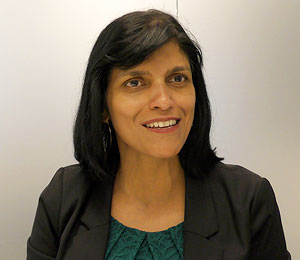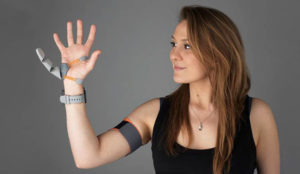Beena Ammanath is vice president for data and analytics at GE Digital.
She has worked in the data analytics field for more than 20 years and serves as board director at ChickTech, a nonprofit dedicated to recruiting girls and women into the tech workforce and retaining them once they’re there.

Ammanath also serves on the Cal Poly Computer Engineering Program Industrial Advisory Board, helping to shape the future generation of computer scientists with her expertise.
She recently was named one of the top female analytics experts in the Fortune 500 by Forbes contributor Meta S. Brown.
In this exclusive interview, Ammanath speaks to TechNewsWorld about AI, analytics, and diversity in tech.
TechNewsWorld: You are one of the thought leaders on artificial intelligence. How do you think AI will impact businesses and jobs?
Beena Ammanath: I have worked in a number of industries — e-commerce, financial, marketing, telecom, retail, software products and industrial — over the past two decades. I have seen how the growth of data from OLTP systems to data warehouses to big data and data science has impacted businesses.
I believe we are just at the tip of the iceberg with AI today. AI is not by itself an industry — more of a technology that is positioned to transform businesses across a number of sectors. AI will be so intertwined and pervasive within business operations in the future that it may be impossible to do business without AI. Fundamental business models of today are going to change as AI evolves.
Tesla’s driverless car is still in its early AI stage, but it won’t be that long before drivers put their cars completely on autopilot. In a few years from now, Uber may not need drivers; just idle cars will be needed. But even more broadly, the whole transportation ecosystem is going to change.
The Palm Jumeirah Monorail in Dubai is a fully automatic driverless train that can shuttle up to 6,000 passengers an hour. The locomotive industry is poised for a revolution — not only passenger trains but also long-haul goods transportation.
There will be an impact on jobs, but I see it more as job roles changing and not necessarily as job reduction. The jobs most at risk are those that are routine-intensive and are strictly defined with limited tasks. If you think of the transportation example, in a few years, we may not need as many drivers, but we will need more programmers and support personnel.
What would you say are the key attributes for succeeding in a data science career?
Ammanath: Besides the technical skills, I believe creativity, curiosity, and storytelling are all skills that will help one succeed in data science. Being curious will help find the correlations hidden within data. And once you find the correlations within the data, it’s really about tying it within the context of your business and using those correlations to drive productivity savings by enhancing existing products or starting new products — and that’s really where the creativity and storytelling come in.
It’s easy to learn technical skills, but there is an art in telling the story behind the correlations within the context of the business, which is not really taught but is crucial to drive the adoption of data science.
Do you think women bring a different perspective to data analytics than men?
Ammanath: I think that every individual brings a different perspective to the table. It doesn’t matter whether it’s men or women. The more diverse group you have at the table, the more diverse the perspectives and the viewpoints, and that really helps one build solutions and products that reach a broader group.
You’re able to build a product that’s more connected to the real world because the real world is very diverse. Your organization and your team have to look as diverse as the real world.
What is your advice to girls and young women seeking to get involved in STEM fields?
Ammanath: My first advice would be that you shouldn’t get involved in STEM fields just because somebody tells you to do it — and this is true for any career choice that you might make. If you have a natural liking for STEM and you are passionate about STEM, don’t let anybody and any external bias stop you from pursuing a career in STEM.
Our current systems are not really conducive for girls and young women to pursue an education in STEM and also to grow within a career in STEM. For most, it’s an uphill battle, and many drop off before they can reach their true potential.
You have to be prepared for it — because, honestly, the world needs your expertise in this highly digital world. You have to build a support group that you can rely on to help you through challenging situations and help you become stronger and reach your true potential.
It’s not an easy road, but the satisfaction that you get from pursuing and succeeding in a field you are passionate about is well worth the challenge.
You’ve made the argument that retaining women in tech fields is an important part of the gender equality equation. Why is the retention of women in STEM fields an issue, and how can it be addressed?
Ammanath: The gender equality equation is composed of two key parts: increasing the pipeline of women joining tech and retaining and growing the women who are already in tech.
I believe that today there are a number of organizations focused on a number of initiatives to get more women into tech. I think we will truly see the numbers improve over the next decade or so for women studying in STEM fields.
However, there’s a huge need to retain and grow the women who are already in STEM fields. Women remain underrepresented at every level in the corporate pipeline. For every 100 women promoted to manager, 130 men are promoted. The higher you rise in your career, the fewer women you see.
Most tech companies don’t have gender-diverse leadership. Even if we increase the pipeline, we lose a lot of women when they reach a certain stage in their careers due to a number of reasons. Companies need to look deeply within their culture to understand why that happens and provide the mechanisms needed to retain and grow a diverse leadership team.
Women deal with life events differently, and most organizations don’t provide the support they need to deal with life events and keep growing in their careers. There should be a way to get them back and engaged in the workforce.
Companies offer internships for new graduates, so maybe one option is to provide internships for women re-entering the workforce. Certainly, they have the experience and maturity — they just need help to get back into the corporate world after a career break.
The other is being aware of unconscious biases that exist in the workforce and eliminating them. Don’t look at a person’s career as a linear track. Look at the ability of that person. Getting more conscious about the biases that exist within the system and providing a safe, open environment for women to grow in their careers is critical.
What role do mentoring and coaching play in helping women to succeed in tech fields?
Ammanath: Mentoring and coaching help no matter where you are in your career. It’s not just young women or those who are early in their careers that can benefit from a mentor. You need mentors at every stage in your career.
I have several mentors who have really helped shape the way I approach my career — by providing a differing viewpoint based on their experience, by talking through situations I was struggling with and providing ideas to navigate them — and most importantly, by believing in me at all times, even when I was ready to give up.
I have been blessed to have some amazing men and women who have mentored me during my career, and I do what I can to give back to the women and men who reach out to me for help or guidance.























































